In the heart of Prlekija ...
... not far from Ljutomer, Veržej square lies on the right bank of the river Mura. The town is importantly marked by the Salesian Centre, with its 100 years tradition, as well. Collegium Marianum that the donor Anton Puščenjak longed for and that was later built by Maribor canon Dr. Franc Kovačič and his associates was developed into a distinguished institute for education of young people from both sides of the river Mura. After the war and despite the different spirit it brought with, the institute has remained the centre of education which has paved the way for contemporary education in Veržej. Today, in the spirit of the founder of the Salesians, John Bosco, the institute is once again developing into a cultural, spiritual and handicrafts centre with a special tourist offer.
Within the framework of the Marianum Institute Veržej there are three operating units: Mavrica Pension, Marijanišče and Centre DUO.
 |
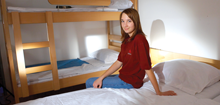 |
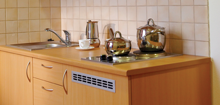 |
Mavrica Pension
The Pension offers 26 rooms with two, three and more beds. For the well-being of families there are also tea kitchens in some of the rooms, arranged to meet the basic needs of the youngest family members, and even the elderly people can peacefully have a sip of something warm to refresh themselves. Other rooms allow you to rest and spend some days in peace as well.
Common youth room in an interestingly arranged attic part for 30 young and young at heart allows for comfortable accommodation of organised groups, where they can carry out their own programs.
An excellent cousine with culinary delights of Prlekija and Prekmurje provides for additional well-being and refreshment of all guests in Mavrica Pension, whether full or half board. You can treat yourself to a glass of home made wine or apple juice. At wine tastings we present the excellent wines of Prlekija.
A modern equipped Kovačič Hall with 120 seats and other smaller halls with 20-30 seats offer the possibility of business meetings, lectures, seminars and consultations.
A playroom is available in the basement where you can amuse yourself playing pool, table tennis, air hockey or hand football. The place is suitable for social meetings continuing late into the night without upsetting other guests seeking rest.
The surroundings of the Institute offer the possibility of recreation and sport. On the playgrounds you can play football, volleyball, basketball, and you can undertake the paths through the plains of Prlekija and Prekmurje by bike or turn towards the nearby hills.
The surrounding Pannonian thermal springs offer swimming in in-door and outdoor massage pools and swimming in pools with thermal and ordinary water.
Marijanišče
The excellence of our Centre is that in addition to the options for physical relaxation or professional training it also offers spiritual enrichment. You can find your inner peace and spiritualy refresh yourself in the house chapel of Mary Help of the Christians where regular worship services and original meditations take place.
The lobby of the Institute always gives rise to inner satisfaction by hosting various painting and photography exhibitions which enrich the house and its guests.
The nicely arranged facilities offer groups of First Communion and Confirmation recipients, youth and spouse groups and members of various spiritual movements to carry out their own programs. Within the framework of Marijanišče, different spiritual programs for children, youth, spouses, families and adults are prepared and led by the Salesians with the help of animators of the Salesian Youth Centre Veržej.
Centre DUO
The youngest and most innovative unit of Marianum Institute Veržej is the Centre DUO. In addition to regular education, marketing and promotion of almost forgotten handicrafts professions within the north-eastern Slovenia, the Centre prepares creative workshops for guests and visitors in knitting with natural materials, working with the potter's wheel or blacksmith's bellow and more.
An integrated and professional program, desirous of passing traditional experience and knowledge to younger generations, is suitable for school and other closed groups, where participants learn the history and background of people's lives in these professions.
You are kindly invited to attend various handicrafts and ethnological exhibitions, among them the most famous exhibition at Christmas and Easter time which can be visited in the Puščenjak Hall of the Centre DUO. For researchers and gourmets also information and documentation centre is being developed in these premises, which is intended to collect and keep the material of extinguishing handicrafts professions.
In the handicrafts shop you can view and purchase wonderful products made and designed from natural materials such as clay, straw, bast, willow, wood, metal and other by craftsmen of this area. With the purchased products you will keep unique memories of the Marianum Institute and landscape of the river Mura. You can also buy them as presents to delight your beloved ones and thus help preserve the genuine handicrafts tradition that does not pollute, does not depersonalise, but gives dignity to human work and with that to life.
The family camp is available for groups and families who feel with nature and want to actively spend their leisure time in a more genuine manner.
The winder surroundings ...
... offer numerous possibilities for excursions, walks and travel adventures. The forest learning pathways along the backwaters of the river Mura, the Babič mill, the Beekeeping Museum, the memorial rooms of Franc Kovačič and Slavko Osterc in the Veržej Cultural Centre, the parish church of St. Michael and the ancient Mary’s pillar statue are just some of the nearby points worth visiting.
The nearby towns of Ljutomer and Murska Sobota with the surroundings offer various possibilities for cultural activities, tourism and entertainment. The wineries of Jeruzalem and Goričko, rafting on the river Mura and panoramic flights provide for a joyful atmosphere as well.
The proximity of the Austrian, Hungarian and Croatian borders allows for all-day excursions to border towns and the advice and help of our tourist guide in the organisation and performance of excursions will make sure that no beauty of Prlekija and Prekmurje is going to be overlooked and that you will come to know each and every corner and taste all the delights of our surroundings.
Salesian College Marianum Veržej 100th Anniversary
After several years of talks, which began in 1908, between the Bishop of Maribor, Dr. Mihael Napotnik, Professor Franc Kovačič and the superiors of the Salesian community in Turin, it was agreed that a college should be established in Veržej. With the help of Anton Puščenjak the first Salesians settled in this village in autumn 1912. The college established in Veržej, called “Marianum”, was first occupied by students of German nationality who had started their studies in the college of St Boniface in Penango, Piedmont. The original plan of the Salesian Provincial Superior, Pietro Tirone, who took over the leadership of the Austrian Province in 1911, was to establish the college as a kind of transitional centre for the German-speaking students before they were transferred to their mother-country, Germany. This plan was prevented by the outbreak of the First World War. The college was blessed and inaugurated in October 1912, followed by the chapel of Our Lady of Good Counsel a year later. In 1914 and until the end of the war, the college served as a school for German students (“Sons of Mary”) and in the last year of the war as a novitiate of the Salesian Austrian Province under Francesco Binelli, and also as a school of philosophy. The college during these years was directed by Aurelio Guadagnini. The number of German-speaking pupils inevitably decreased during the war years as many of them had to join the army, but this helped to provide vacancies for a number of students of other nationalities - including more and more Slovenes.
Between autumn 1919 and April 1941 the college Marianum served as a kind of pre-novitiate for the Salesian community in Yugoslavia. At first there were four classes of gymnasium, then five and from there the pupils went to the novitiate in Radna. The college Marianum took in an average of about 100 pupils, reaching 140 students in the last few years before the war. As it had the status of a private church college, the pupils had to take exams in public gymnasiums in the towns of Maribor, Murska Sobota or Ptuj at the end of each school year. The pedagogical work was carried out by the Salesians, who directed the college and by young Salesians nearing the end of their studies. The school followed the programme of a secondary school with the addition of Latin, but remained essentially a Salesian educational system.
The college chapel, with an image of Our Lady of Good Counsel, provided the centre of spiritual life for staff and students. All important liturgical meetings were held there. Outside, behind the chapel there was a Lourdes grotto. The bigger solemnities were held in the courtyard of the college and were often attended by the faithful from Veržej and the neighbouring parishes. The biggest solemnity each year, after that of Our Lady of Good Counsel in April, was on the Sunday after the liturgical feast of Mary, Help of Christians. This feast would be attended by priests from the neighbouring parishes and distinguished priests from the Diocese of Maribor. In 1934, the Arch-Confraternity of Mary, Help of Christians was founded. Crowds of the faithful would also gather for the feasts of St John Bosco and St Francis de Sales.
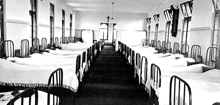 |
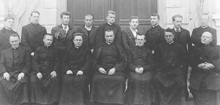 |
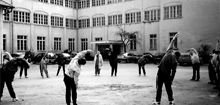 |
Different singing and musical groups were active at the college from its beginning. Pupils from Penango brought instruments for a brass band with them. With the outbreak of war, this band discontinued, but smaller musical groups still managed to survive. In 1924 the band was re-established with an orchestra joining it. These musical groups participated in all major church gatherings at the college, in the parish and surrounding area. They were often invited to performances of gymnastic teams and Catholic Action gatherings. The college had its own theatre hall, where pupils and youth from the local district put on public performances. The hall also served the needs of the elementary school in the district, which did not have such a big room at its disposal. Theatrical works were translated from other languages and some original ones were prepared by priests, who were active at the college.
As early as 1913 a youth centre next to the college became very active. At the beginning it served as a kind of feast day oratory, but it soon developed other activities for the youth of Veržej and neighbouring parishes. Over the years, many young people discovered the possibility of realising their vocations in the Salesian community and some of them even in missions. The college gained an additional task when the Salesians took over leadership of the parish of Veržej in 1921. It was a small parish but it was a new form of pastoral work and presented the community with a new and big challenge. The Salesians often became helpers in other parishes as confessors and preachers at church festivals and even substituted priests. Once Communism took over power in 1945 this parochial work became, in fact, the most important form of Church presence in the lives of the people. The Salesians took over a number of parishes and tried to revive their Salesian vocation in new conditions and added an authentic contribution to pastoral initiatives.
In April 1941, during the Nazi occupation, the college became a target of Nazi hatred towards the Church and everything Slovene. The pupils and the Salesians were chased away at the beginning of the war, the library and the archives at the college were destroyed and all the musical instruments seized. The college was taken over by the Nazi organisations and turned into a working camp. The chapel became a gathering place and a sports groups’ training hall. The objects from the chapel were taken to the parish church. College property was partially seized, and also from the people who worked in it. The place was left without a priest and it was only occasionally visited by priests from elsewhere. The Nazis took two of the three bells from the parish church.
After the war was over, new authorities came into power and planned to eliminate the Church from public life. The college was nationalized and became part of the so called common public property. In May 1945, the college was inhabited by a small group of Salesians, but soon they had to leave. It was occupied by war orphans until the authorities turned it into an institution for young offenders, boys and girls who had got into trouble. They underwent re-education with special measures, whilst living in an area where their movement was restricted. The college Marianum served as a re-educational institution until 1989, when it was closed. During the war in the Balkans the college was used to shelter refugees, a service for the most needy. This was agreed with the local authorities. In 1991 the Salesians began a long lasting procedure to get the building back.
This happened in 1998, when a new era in history began for the college Marianum in Veržej.
In co-operation with the municipality and the head of the local Church of the Diocese of Murska Sobota, the Salesian community prepared an elaborate program of renewal as well as many initiatives, which were included in the pastoral plans of the Diocese and the cultural work of the village. The original desire to make the college a professional crafts and art school, which was initially also the wish of several of the neighbouring municipalities, became unfeasible for political reasons. Gradually, however, the college was able to introduce special forms of education in art and crafts as a way of preserving the rich cultural heritage, which is typical for this part of Slovenia. The restoration work was finished in 2006 and the college regained all its former beauty and functionality. The newly founded college Marianum was divided into three: the unit Marianum carries out pastoral and spiritual programs for different groups, especially young people who are preparing to receive sacraments, but also adults; the private hotel Mavrica is responsible for the rooms used for different gatherings and groups; and the Centre for the Development of Arts and Crafts (DUO) works to preserve the cultural heritage of the region and to organize educational and tourist- information activities.
Vir: Bogdan Kolar, Marijanišče v Veržeju 100 let


